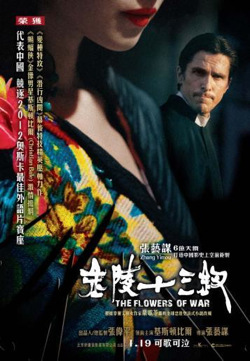|
 With a sales trailer centered on Christian Bale, The Flowers of War promised US buyers a film about an American hero saving the day, but the final production delivered by Zhang Yimou failed to meet the expectation fostered by the advertisement. With a sales trailer centered on Christian Bale, The Flowers of War promised US buyers a film about an American hero saving the day, but the final production delivered by Zhang Yimou failed to meet the expectation fostered by the advertisement.
The following is what we saw in the trailer: Bale confronts face-to-face with Japanese intruders. Bale runs through corpse-strewn, hellish streets. Bale is looked up bellowing “ Stop! This is the house of the Lord!” Bale is looked down helplessly wandering under the imposing roof of the cathedral. All these scenes suggest a story of an American lone wolf risking his own life for the sake of a group of Chinese children during the Japanese siege of Nanjing in 1937.
Yes, we saw all those scenes in the final production again, but we got a far different story.
John Miller (Christian Bale) is an American mortician. He weaves his way through the war-torn Nanjing streets to Winchester Cathedral to bury a priest. To his disappointment, the body of the priest has been blown up by a Japanese bomb. Having failed to get his payment, John ransacks the collection box for cash, the cellar for wine and finally settles himself in the comfort bedroom formerly belonged to the dead priest.
An uninvited group of courtesans break into the cathedral seeking refuge in the basement and hence there is a conflict of interest between the pubertal convent schoolgirls, led by Shu (Zhang Xinyi) and the shiny-dressed, boisterous women, led by Yu Mo (Ni Ni). Believing that the Japanese won’t touch Westerners, Yu Mo turns to Miller for protection and promises, with a sultry tone, Miller a reward “in ways that you can’t imagine.”
Losing their sanctuary, the schoolgirls are found out by the sexually hungry Japanese soldiers. Tormented by the girls’ screaming, the selfish Miller completed his transformation into a hero in a split second and therefore the film comes to the point where Miller waves the red cross banner shouting “Stop! This is the house of the Lord!” as we’ve seen in the trailer.
This moment is supposed to be the point of no return for Miller and we expect him escalating his involvement and sacrifice. But unfortunately, from that moment on, it is the fancy women, not Miller, who propel the plot. When the stone-faced Japanese villain, Mr. Hasegawa (Atsuro Watabe) demands the schoolgirls’ presence in their celebration party, which will result in rape according to the film’s suggestion, Yu Mo comes forward, bravely offering herself to the predators, another transformation from a lowlife to a saint in a blink of an eye.
Thus Christian Bale loses his status as the leading man. But don’t worry, we’ll still see a lot of him in the rest of the movie. He will still be trudging under the solemn dome of the cathedral, as we’ve seen in the trailer, pondering how to play his part in the girls’ salvation (and in the movie as well?). It turns out that his make-up skills gained from his career as a mortician gets a payoff: He gives the group of full-grown prostitutes a makeover (according to a review by Todd McCarthy, the word ‘makeover’ is the film’s most unfortunate lapse into modern parlance), helping them pass for teen-aged schoolgirls.
John Miller qualifies for a narrator from every perspective. But he is not even a narrator. The whole movie is loosely structured by the voiceover of Shu. “Loosely” is because there are a number of scenes that could not be seen by Shu. Two eminent examples: The Chinese soldiers use their own bodies to explode the Japanese tanks during the battles in alleys; Two prostitutes get chased, raped and killed in a brothel.
Also from the problematic point of no return, the presentation of the story makes the premise of the film unconvincing. Without any doubt, the Japanese raped a great amount of Chinese women in Nanjing 1937 and they forced Chinese civilian women into institutionalized sexual slavery during World War II. But did they need to plot this atrocity as carefully as described in the film? Did they need to rape the girls in a well-prepared ritual so as to give the would-be victims an extended period of time to plan their escape? In short, how big a deal these 13 schoolgirls are in the Japanese occupants’ mind?
An air of self-importance poisons the second half of the film and blocks any possible further thinking about war and humanity. And Zhang Yimou is not a separate case. The self-importance we see in The Flowers of War is the epitome of a popular mindset among contemporary Chinese people. Consciously or unconsciously, we think ourselves matter a lot to the world.
But if the girls matter that much, why does the trailer of The Flowers feature Christina Bale? What’s even worse is that Bale is marginalized in the actual film. Shimmering on the screen, he stumbles through the screen time as the probably most expensive extra in China’s movie history.
The Flowers of War opened in China on Dec 16th and will be opening in New York, Los Angeles and San Francisco on Dec 23th. Let’s hope that Christian Bale’s presence in the film draws a wide range of American audience to the theater and helps Zhang Yimou win over the heart of the Oscar voters.
Anna Wang
Anna Wang(王芫), a Chinese Canadian writer who is currently living in Beijing. She has published seven books in Chinese(four novels, one collection of short stories, one collection of essays and one translation). Despite her creative writing career, she is enthusiastic about reporting China's cultural activities to avid English readers. |









 With a sales trailer centered on Christian Bale, The Flowers of War promised US buyers a film about an American hero saving the day, but the final production delivered by Zhang Yimou failed to meet the expectation fostered by the advertisement.
With a sales trailer centered on Christian Bale, The Flowers of War promised US buyers a film about an American hero saving the day, but the final production delivered by Zhang Yimou failed to meet the expectation fostered by the advertisement.
